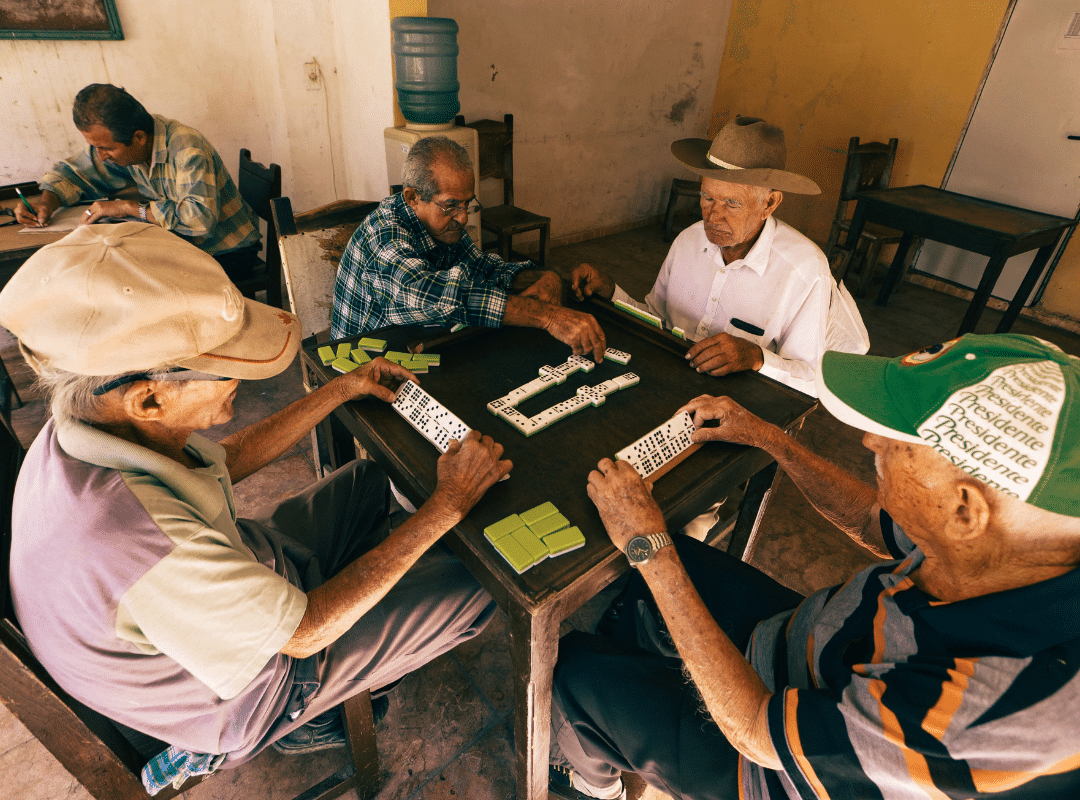Top Games for Elderly People to Stay Active and Engaged
Staying mentally and socially engaged is essential as we age, and one of the most effective ways to do so is through playing games for elderly people. Whether it’s spending time with loved ones, making new friends, or keeping the mind sharp, games provide joyful and meaningful experiences.
At The Westland House, we believe in offering a variety of games for elderly people that cater to both mental stimulation and physical activity. From sit-down games for senior citizens to more interactive group play, the right activities can enhance quality of life in fun and rewarding ways.
Benefits of Puzzle Games
While you engage in puzzle games, you’re not just having fun but also exercising your brain. Research shows that regularly tackling various puzzle types, like crosswords and Sudoku, can greatly boost cognitive function and delay memory decline. Using different puzzle strategies enhances your logical thinking and problem-solving skills, keeping your mind sharp. Additionally, puzzles require focus and concentration, which can help reduce stress and improve overall well-being. Whether you prefer a solo challenge or a group activity, puzzles foster a sense of accomplishment and connection with others. Incorporating puzzles into your routine enhances your mental agility and promotes social interactions, making it a rewarding experience for everyone involved. Furthermore, engaging in activities like puzzles can stimulate cognitive functions, benefiting your overall mental health.
Engaging Jigsaw Puzzles
Engaging in jigsaw puzzles offers fantastic cognitive benefits, helping to sharpen your memory and problem-solving skills. Plus, working on a puzzle can create a sense of connection when shared with friends or family, fostering enjoyable social interaction. Choosing the right difficulty level guarantees you stay challenged without feeling overwhelmed, making it a rewarding activity for everyone. Additionally, incorporating enriching daily activities can further enhance overall wellness and enjoyment for residents.
Cognitive Benefits of Jigsaws
Jigsaw puzzles offer numerous cognitive benefits that considerably enhance mental agility and well-being. Engaging with these puzzles sharpens your visual-spatial skills and boosts your short-term memory and problem-solving abilities. Research shows that consistently working on jigsaws can lead to significant cognitive enhancement, helping to stave off age-related decline. As you piece together intricate designs, you stimulate areas of your brain responsible for logic and reasoning. These jigsaw benefits extend beyond mere entertainment; they provide a fulfilling challenge that fosters mental resilience.
Additionally, creative art activities promote social interaction and emotional well-being, making jigsaw puzzles complement other engaging pastimes. By incorporating jigsaw puzzles into your routine, you’re actively investing in your cognitive health while enjoying completing each puzzle. It’s a rewarding way to keep your mind engaged and vibrant.
Social Interaction Through Puzzles
When you gather around a table to piece together a jigsaw puzzle, you challenge your mind and create a vibrant social atmosphere. Engaging in puzzle challenges fosters teamwork strategies, enabling you to collaborate with others and share ideas. As you work together to find the right pieces, laughter and conversation flow, enhancing connections. This social interaction is crucial for emotional well-being and can reduce feelings of isolation. Research shows that such activities stimulate cognitive functions and promote a sense of belonging. By involving others in these enjoyable experiences, you enrich their lives while enjoying the benefits of companionship. Additionally, the community environment created through shared activities like puzzles can significantly enhance the overall quality of life for seniors. So, grab a puzzle and invite friends or family to join you!
Choosing Appropriate Difficulty Levels
Selecting the right difficulty level for jigsaw puzzles can greatly impact the enjoyment and engagement of those involved. When considering difficulty assessment, think about the players’ experience and preferences. For beginners, start with larger pieces and simpler images to build confidence. As skills improve, introduce more complex puzzles for personalized gameplay, ensuring they remain challenging yet achievable. Engaging in puzzles at the appropriate difficulty fosters a sense of accomplishment, enhancing cognitive skills while reducing frustration. Additionally, adapting the puzzles to match the players’ mood and energy levels can keep the experience enjoyable. Remember, the goal is to promote social interaction and mental stimulation, creating a fulfilling and enriching activity for everyone involved.
The Joy of Board Games
Board games offer a wonderful way to spark social interactions, bringing friends and family together for laughter and connection. These are ideal sit-down games for senior citizens and serve as excellent games for the elderly in nursing homes, offering both entertainment and cognitive stimulation.
Social Interaction Benefits
Game night creates a welcoming atmosphere where seniors can enjoy each other’s company, enhancing their social well-being. These interactions foster positive group dynamics and strengthen relationships, combating feelings of loneliness.
Cognitive Engagement Activities
Games like Scrabble and Chess can enhance memory retention and cognitive flexibility. These games for elderly people challenge you to think critically, strategize, and recall information. Plus, they serve as enjoyable ways to engage with others.
Variety of Game Choices
Choosing from a range of games ensures there’s something for everyone:
- Cranium and Ticket to Ride for strategy
- UNO for a simple card challenge
- Checkers and Connect Four for classic fun
Many of these can be adapted as free sit-down games for senior citizens, ideal for social settings or one-on-one sessions.

Exciting Card and Dice Games
Card games such as Bridge, Gin Rummy, and Old Maid are fantastic party games for senior citizens. They offer mental stimulation and encourage teamwork. Oversized cards and simplified rules make them accessible for all.
Dice games like Yahtzee, Bunco, and Liar’s Dice are fun physical games for seniors, encouraging both movement and strategic thought. They can be played in pairs or groups, helping to improve math skills and critical thinking.
Check out AARP’s guide to classic games and Senior Lifestyle’s game ideas for more inspiration.
Enhancing Memory and Connection
Playing games helps improve memory by exercising the brain in enjoyable ways. Memory games, puzzles, and card games all enhance recall, logic, and visual-spatial awareness.
| Game Type | Benefits |
| Memory Games | Enhance recall skills |
| Puzzle Games | Improve visual-spatial skills |
| Card Games | Boost strategic thinking |
| Board Games | Foster teamwork and problem-solving |
Promoting Social Engagement Through Games
Incorporating games for elderly people into daily routines fosters communication and connection. Whether it’s a quiet afternoon puzzle or lively party games for senior citizens, gameplay reduces isolation and lifts spirits.
These activities also encourage physical activity, especially physical games for seniors that involve mild movement or coordination. Even free sit-down games for senior citizens can improve mental and emotional health.
Make Every Day More Joyful With Games
Games do more than entertain; they enrich daily life. By choosing suitable games for elderly people, you can enhance well-being, strengthen relationships, and keep minds sharp. Whether you’re looking for sit-down games for senior citizens, exciting party games for senior citizens, or light physical games for seniors, there are countless ways to make life more vibrant.
To learn more about our engaging activities or schedule a visit, contact The Westland House at 734-326-6537 or visit our Contact Us page.
Frequently Asked Questions
What games are good for senior citizens?
Games that promote cognitive engagement and social interaction are ideal for senior citizens. These include card games like bridge or rummy, board games such as Scrabble and chess, and puzzles like Sudoku or crosswords. Digital brain-training apps and memory games are also great for stimulating mental activity. Group games like bingo can foster community and enjoyment.
What are good activities for old people?
Good activities for older adults include light physical exercise like walking, yoga, or chair aerobics to support mobility and wellness. Creative hobbies such as painting, knitting, or playing a musical instrument can provide relaxation and a sense of accomplishment. Social activities like book clubs or community classes help prevent isolation. Gardening and volunteering also offer purpose and engagement.
What is the 20 Questions game for seniors?
The 20 Questions game for seniors is a fun, simple activity where one person thinks of an object, place, or person, and the others have up to 20 yes-or-no questions to guess what it is. It’s excellent for stimulating memory and logical thinking. This game encourages conversation and can be adapted for all cognitive levels. It’s especially enjoyable in group settings or with family members.
How do you entertain an elderly person at home?
Entertaining an elderly person at home can involve a mix of mental, physical, and emotional activities. You might watch your favorite movies, play games, do crafts, or read together. Personalized playlists, photo albums, or storytelling sessions can also spark joy and connection. Tailor the entertainment to their interests and physical abilities for the best experience.

